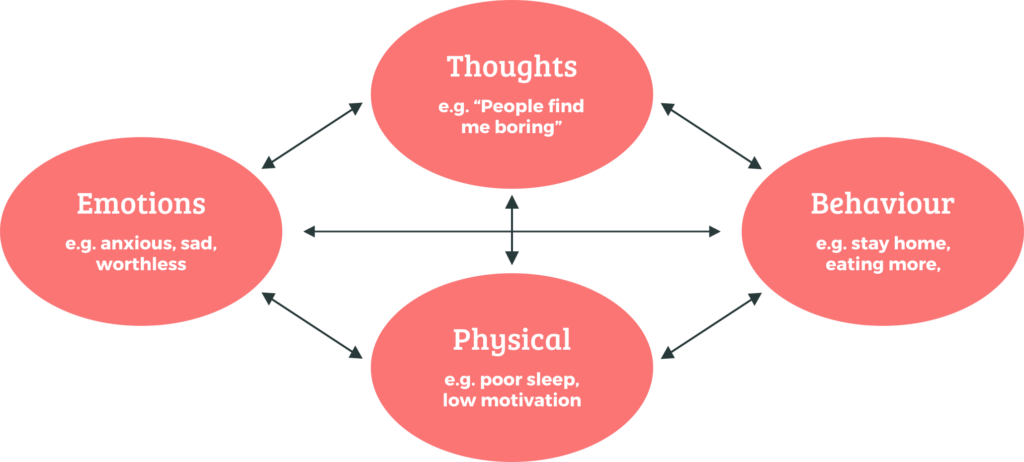Easy Ways To Thrive In Mental Health Awareness Month
May is Mental Health Awareness Month. It is a time to remind us to take care of mental health and improve wellbeing. Not only this month, but on a daily basis, we get the message that the wellness of our mind matters! You deserve to be happy and healthy in every part of your life!
What is Mental Health?
During Mental Health Awareness Month, you may hear the phrase “mental health” a lot but do not know exactly what it means. Think of how you take care of your body. You can do things to improve your physical health like eat healthful foods, exercise daily, and get enough sleep. Similarly, you can do tasks that care for your mind, as well.
Not only is it essential to grow and thrive in Mental Health Awareness Month, but never hesitate to take a mental health day to take care of your mental health needs. According to the CDC, mental health can affect our emotions, how we interact with people, and the way we think. Moreover, mental health affects our overall wellness. When we have healthy minds we can make better choices, have better control over our emotions, and live happier lives.
Why is Mental Health Important?
As mentioned before, mental health affects us in many ways, including emotionally, physically, cognitively, and socially. In fact, thoughts, feelings, physical experiences and behaviors are all interconnected, as illustrated in the chart below. In other words, when things happened, our interpretations could influence subsequent emotions, behaviors, and body. Meanwhile, all these elements clearly affect each other.
Physically:
In order to keep our bodies healthy, it is important to take care of our minds, as well. When people struggle with depression, for example, physical symptoms could surface. Depression can make you feel so low that it can be hard to complete daily tasks. As a matter of fact, it could even hinder your capability to function physically for small things such as taking a shower or brushing your teeth. There is nothing to feel embarrassed about when it comes to these challenges. You are not alone. Your struggles are valid and normal when it comes to depression.
According to WebMD, people with depression can also deal with other diseases such as, diabetes, cancer, heart-problems, etc. People who have depression may have problems with sleeping, as well.
By the same token, if you have anxiety, you feel all physical symptoms. Any of these symptoms could make you feel very uncomfortable, heart racing, dry mouth, trembling, sweating, chill, headache, and insomnia. A panic attack, for instance, could be so debilitating that it mimics a heart attack and you may even feel like you are dying.
Notably, if you have eating disorders, your body sends out clear signals too. Typical physical signs and symptoms could include missing periods, feeling cold all the time, poor immune function, hair loss, dry skin, dizziness, anemia, cavities, and many more.
Emotionally
Without a doubt, mental health can affect how you handle your emotions. When you have different mental health concerns, your emotions might be harder to deal with. It is important to take care of your mental health and seek treatment for ways to improve your emotional control.
Some people who struggle with their emotions regulations have Borderline Personality Disorder (BPD). People with BPD can express their emotions in intense ways. These emotional struggles can affect these people’s self-image, thoughts, impulse control, and relationships.
Likewise, children with ADHD might also have a hard time dealing with their emotions. They might feel their emotions intensely and react to situations in very strong ways. For example, a child may lose their favorite toy and get extremely upset. These feeling may last for an extended time. For ways to help to handle emotions better, check out our article here.
Cognitively
It goes without saying, human brain does not just react to the world as it is: it reflects on the past, imagines what could be, and makes plans to turn thoughts into reality. Therefore, cognitively, if you think something might be true, even if it is not, it will impact how you feel, what you do and your body response.
Not surprisingly, if you have depression, the universal language of negative thoughts could include things such as, “I’m a loser”, “Nobody cares”, or even suicidal thoughts “There is no meaning to continue to live”. Similarly, if you have health anxiety, your brain could misinterpret normal physical sensations as signs of serious illness. That is, cognitively, the irrational thoughts might be “I must have cancer”, or “These symptoms are like HIV”. Consequently, these could easily lead to fears, constant doctors’ appointments, and self-medication.
Socially or Behaviorally
Mental health can also affect your behaviors, social life, and the ways of communicating with others. For example, if you have depression, you may tend to isolate yourself because you do not have the energy, nor do you enjoy talking or laughing with friends like you used to. Similarly, if you have anxiety, it can affect your social life a lot too. For instance, if you have social anxiety (SAD), you may tend to avoid social interactions because you worry about the attention and judgment from others. Consequently, these fears can easily cause emotional withdraw, fear of social settings, isolation, and daily functioning problems. To learn more about SAD, read our article here.
How to Grow During Mental Health Awareness Month
As you can see, your mental health is very impactful in many areas of life. As humans, we all go through different obstacles that affect and shape us. That is, we may struggle with different mental health problems and hurt in different ways. Remember that this is totally normal. Nothing about struggling with mental health should be looked at as bad or embarrassing. We all should accept and support one another on our journeys in life – each one is unique in their own way.
Additionally, seeking professional help is always a great way to better our minds. Talking to a mental health professional can help us deal with our emotions better, react to stressors in a calmer way, and let go of the hurt we carry with us in order to heal.
In fact, Mental Health Awareness Month can be a time where you explore your mental health and look for ways to enhance it. For a Daily Check-List Challenge and other simple ways to help boost your mental health, keep reading!
Daily Check-List Challenge
Sometimes when you try to take care of mental health, you may get stressed by the growing list of tasks you must complete. In this case, it is helpful to take your journey day-by-day! Instead of trying to do so much in one day, try completing these simple but effective tasks.
Morning
- First, wake up and try to think of 3 things you are grateful for
- You can be thankful for anything – your family, your friends, your pets, nature, etc.
- Keep it simple – e.g. I am thankful for waking up today, for my bed that I can rest in, and for my best friend that makes me happy
- There may be some days where it is hard to think of anything to be thankful for and that is ok! Do this activity whenever you can!
- For more tips on gratitude read our article here
- Second, say 3 positive affirmations
- Positive affirmations are sayings that you can tell yourself out loud or in your head. These are positive statements about yourself, your life, or the world around you
- Some examples can be: I am strong, I am worthy of love, and the world has so many beautiful experiences waiting for me
- For more tips on positive affirmations read our article here
- Third, drink a glass of water
- Staying hydrated is great for your wellness, overall
- Fourth, eat something that will help fuel you in the morning
- Fifth, set 3 goals for your day
- We can get anxious when we feel like we have too many things to do in one day. Try and set 3 realistic goals that you feel will be manageable to accomplish
- When you do each task, cross out the goal from your list. This will help you see that you are getting things done, and can help you feel proud of yourself
- Remember that goals can feel great to complete, but if you do not do everything on your list that is ok! Tomorrow is a new day, full of all new chances for you to do whatever needs to get done
Afternoon
- Next, check in with yourself
- How is your day going? How do you feel?
- You can ask these questions to yourself or write them down
- Remind yourself that you are capable of anything and are strong enough to get through this day
Night
- Finally, say 3 more affirmations before you fall asleep
- After a long day, sometimes we just need to remind ourselves that we are proud of what we’ve done and that we have the capability to do it all over again, tomorrow
With this in mind, try doing these simple tasks each day! You deserve to promote feelings of positivity and happiness in your life!
31 Simple Ways to Promote Self-Love this May
Here are 31 ways to show yourself love for the 31 days of Mental Health Awareness Month. You can try doing one of these tasks each day!
- Listen to your favorite song or album
- Make a new playlist
- Do a hobby you enjoy
- Do a face mask/skincare
- Take a relaxing bath
- Watch your favorite movie or show
- Take a walk in nature
- Talk with a friend who makes you happy
- Journal
- Make your bed
- Make a gratitude list
- Color in a mindfulness coloring book
- Try growing/taking care of a plant
- Check on your loved ones
- Help someone or make someone else’s day brighter
- Wear an outfit that makes you feel confident
- Start a new book
- Put positive affirmations on sticky notes and place them around your room
- Dance to a happy song
- Try cooking or baking a new meal
- Try to learn a new skill
- Meditate
- Practice mindfulness
- Do some creative writing
- Set a specific time where you wake up and go to sleep
- Read some inspirational quotes
- Buy yourself some flowers
- Watch the sunset or sunrise
- Clean your room or dishes
- Take a break from your phone
- Set goals for the next month
With mental health awareness in mind, our therapists at Mind Connections in New York are here to support and help you in your journey. In a safe and confidential environment, our psychotherapists will help you to to cope with emotions, change behavior patterns, heal pains from the past, and learn coping skills to manage symptoms. Schedule a free 15-minute phone call and start your journal for better mental health.
Content Creator, Victoria Gallo; Reviewed by Dr. June Cao
Special thanks to the contribution of our Content Creator Victoria Gallo





